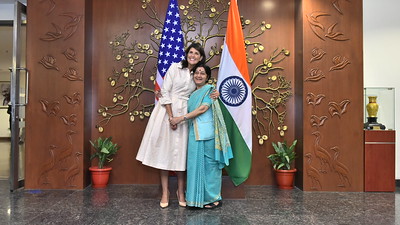
Nikki Haley announced her run for the 2024 presidential election today. But who is she, and where does she stand on specific issues?
Early life, Starbucks name, and parents
Haley was born and raised in South Carolina to Sikh Indian immigrants parents, and her Indian roots and cultural heritage have played an important role in shaping her identity and political career. Born Nimrata Randhawa, she was raised in a traditional Sikh household where she attributes her values of hard work, family, and community service to her parents. And though it seems like she changed her name to get ahead in her political career (or have a Starbucks name), she didn’t white-wash her name and has always gone by Nikki (which is her legal middle name) and was also called Nikki in high school.
In a 2017 interview, she stated, “I am my parents. Every ounce of what I do and why I do it is what my parents taught me. They always said, “If you’re going to do something, be great at it, and make sure that people remember you for it. They’re in my ear all the time.”
First woman and person of color as South Carolina’s Governor
She kicked off her political career as a South Carolina House of Representatives member, where she served from 2005 to 2011. She developed a reputation as a strong conservative voice and pushed for lowering corporate taxes and cutting personal taxes. In 2010, she made a successful bid for Governor of South Carolina, becoming the first woman and person of color to hold the office.
As Governor, Haley advocated for conservative policies and worked to improve South Carolina’s economy and education system. She also became known for her strong leadership in times of crisis, particularly after a shooting at a black church in Charleston in 2015. Haley led efforts to remove the Confederate flag from the state capitol grounds in the wake of the tragedy, earning widespread praise for her leadership and compassion.
Trump nominated United Nations ambassador and presidential candidate
Haley’s success as Governor caught the attention of national Republican leaders, and in 2017, she was nominated by President Donald Trump to serve as the United States ambassador to the United Nations. In this role, Haley became a leading voice in the Trump administration’s foreign policy efforts, particularly on issues related to North Korea, Iran, and Israel. She also gained a reputation as a staunch defender of American interests and values on the world stage.
And she is now the first woman of color to seek the Republic presidential nomination.
She has faced criticism for being inconsistent on specific issues, particularly regarding Donald Trump. She initially criticized him and eventually became his defender during her time as Ambassador to the UN. She has also been flagged as prioritizing big businesses over citizens and needing more delicacy to handle foreign policy, particularly regarding North Korea and Iran.
However, d
espite where you fall on the spectrum, it’s nice to see the changing landscape of who is representing pockets of our population.


 Backyard Pyar: A Unique Dating Experience for South Asian Singles
Backyard Pyar: A Unique Dating Experience for South Asian Singles Ringing in Change: Sakhi’s Historic Achievement
Ringing in Change: Sakhi’s Historic Achievement Good Indian Girl, Sort Of: Sonya Soni
Good Indian Girl, Sort Of: Sonya Soni